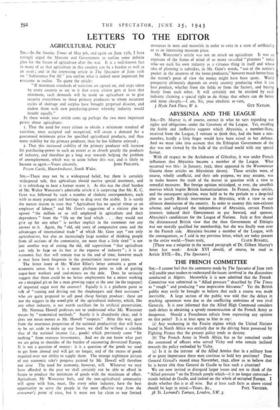ABYSSINIA AND THE LEAGUE
Snt,—Dr. Murray is, of course, correct in what he says regarding our rights and obligations under the Covenant of the League. Yet, recalling the feeble and ineffective support which Abyssinia, a member-State, received from the League, I venture to think that, had she been a non- member, hardly a little finger would have been raised in her defence. And we must take into account that the Ethiopian Government of the day was not viewed by the bulk of the civilised world with any special favour.
With all respect to the Archdeacon of Gibraltar, it was under French influences that Abyssinia became a member of the League. What occurred was this: in January, 1922, there appeared in the Westminster Gazette three articles on Abyssinian slavery. These articles were, of course, wholly unofficial, and their sole purpose, we may assume, was to make known the truth of the matter in question with a view to remedial measures. But foreign opinion misjudged, as ever, the unselfish motives which inspire British humanitarianism. In France, these articles, and the consequent agitation, were held to be the prelude to a deep-laid plot to justify British intervention in Abyssinia, with a view to our ultimate domination of the country. In order to counter this non-existent scheme, and safeguard the independence of Abyssinia, certain French interests induced their Government to put forward, and sponsor, Abyssinia's candidature for the League of Nations. Italy at first shared the. disinterested British view that the then Government of Ethiopia was not morally qualified for membership, but she was finally won over to the French side. Abyssinia 'became a member of the League, with the consequences, as I said in my previous letter, which are today present to the entire world.—Yours truly, CLAUD RUSSELL [There was a' misprint in the second paragraph of Dr. Gilbert Murray's letter last week : Article XVI should, of course, be read as Article XVII.—En., The Spectator.]






























 Previous page
Previous page